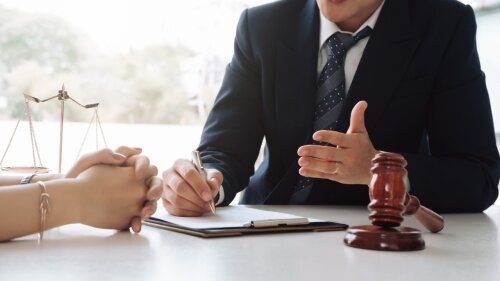Best Motorcycle Accident Lawyers in West Virginia
Share your needs with us, get contacted by law firms.
Free. Takes 2 min.
Or refine your search by selecting a city:
List of the best lawyers in West Virginia, United States
About Motorcycle Accident Law in West Virginia, United States
Motorcycle accident law in West Virginia involves the rules and regulations that govern compensation and responsibilities following a motorcycle collision. Riders in West Virginia face unique risks due to less protection compared to drivers of cars and trucks. The law provides specific pathways for accident victims to recover losses such as medical expenses, property damage, lost wages, pain and suffering, and more. Understanding your rights and obligations is essential if you are involved in a motorcycle accident anywhere in the state.
Why You May Need a Lawyer
After a motorcycle accident, legal situations can quickly become complicated. There are several common scenarios where hiring a lawyer can be very beneficial:
- The other party disputes fault or blames you for the accident.
- The insurance company denies your claim or offers a low settlement.
- You or a loved one suffered serious injuries or permanent disabilities.
- Multiple vehicles or at-fault parties are involved.
- You need help gathering evidence or navigating local court procedures.
- You face expensive medical bills or lost income due to time off work.
An experienced attorney can help ensure your rights are protected and improve your chances of receiving fair compensation.
Local Laws Overview
West Virginia law has several important statutes and regulations that affect motorcycle accidents:
- Helmet Law: All motorcycle riders and passengers are required to wear Department of Transportation (DOT) approved helmets while riding.
- Comparative Fault: West Virginia follows a modified comparative fault system. If you are less than 50 percent at fault, you may recover damages reduced by your percentage of fault. If you are 50 percent or more at fault, you cannot recover damages.
- Insurance Requirements: All motorcycle owners must carry liability insurance with minimum limits set by the state.
- Statute of Limitations: You generally have two years from the accident date to file a personal injury lawsuit.
- Reporting Accidents: Accidents involving injury, death, or significant property damage must be reported to law enforcement.
It is important to understand how these laws impact your rights and responsibilities after a motorcycle accident.
Frequently Asked Questions
What should I do immediately after a motorcycle accident in West Virginia?
Ensure your safety first and seek medical attention if needed. Call law enforcement to report the accident. Exchange information with the other parties, take photos of the scene, gather witness details, and avoid admitting fault.
Do I have to wear a helmet in West Virginia?
Yes, all motorcycle riders and passengers in West Virginia must wear a DOT-approved helmet at all times when riding.
What if I was partially at fault for the accident?
West Virginia uses a modified comparative fault rule. You can still recover damages if you are less than 50 percent responsible, but your award will be reduced by your percentage of fault.
How long do I have to file a claim after a motorcycle accident?
You generally have two years from the date of the accident to file a lawsuit for personal injury or property damage.
What damages can I recover after a motorcycle accident?
You may be eligible to recover compensation for medical expenses, lost wages, property damage, pain and suffering, loss of consortium, and, in some cases, punitive damages.
Should I speak with the other party's insurance company?
It's usually best to consult with your own lawyer before talking to the other party's insurance company, as your statements could affect your case and compensation.
What if the at-fault driver does not have insurance?
If the at-fault driver is uninsured or underinsured, you may still have coverage under your own insurance policy if you purchased uninsured or underinsured motorist coverage.
Can I still recover compensation if I was not wearing a helmet?
Not wearing a helmet may affect your claim, especially if your injuries could have been prevented by wearing one. It may reduce your compensation due to comparative fault, but it does not automatically bar your claim.
What happens if the accident was caused by a road hazard?
If a road hazard or poorly maintained roadway caused your accident, a government entity or contractor responsible for road maintenance may be liable. These cases can be complex and involve different legal procedures.
How much does it cost to hire a motorcycle accident lawyer in West Virginia?
Most personal injury lawyers work on a contingency fee basis, which means you pay no upfront fees and only owe attorney fees if you recover compensation.
Additional Resources
- West Virginia Department of Transportation - Division of Motor Vehicles: For information on motorcycle licensing, insurance requirements, and accident reporting.
- West Virginia Judiciary: Provides information about local court rules and procedures.
- Legal Aid of West Virginia: Offers assistance for those unable to afford private legal representation.
- National Highway Traffic Safety Administration (NHTSA): Offers safety tips and accident statistics for motorcyclists.
- Local Bar Associations: Can help you find a qualified motorcycle accident attorney in your area.
Next Steps
If you or a loved one has been involved in a motorcycle accident in West Virginia, consider the following steps:
- Seek necessary medical attention even if injuries appear minor.
- Gather documents such as police reports, medical records, insurance policies, and evidence from the accident scene.
- Notify your insurance company about the accident in a timely manner.
- Consult with an experienced motorcycle accident lawyer to discuss your case and learn about your rights and options.
- Follow your lawyer's advice regarding communications with insurance companies and the other parties involved.
Taking these steps can help protect your legal rights and improve your chances of receiving the full compensation you deserve.
Lawzana helps you find the best lawyers and law firms in West Virginia through a curated and pre-screened list of qualified legal professionals. Our platform offers rankings and detailed profiles of attorneys and law firms, allowing you to compare based on practice areas, including Motorcycle Accident, experience, and client feedback.
Each profile includes a description of the firm's areas of practice, client reviews, team members and partners, year of establishment, spoken languages, office locations, contact information, social media presence, and any published articles or resources. Most firms on our platform speak English and are experienced in both local and international legal matters.
Get a quote from top-rated law firms in West Virginia, United States — quickly, securely, and without unnecessary hassle.
Disclaimer:
The information provided on this page is for general informational purposes only and does not constitute legal advice. While we strive to ensure the accuracy and relevance of the content, legal information may change over time, and interpretations of the law can vary. You should always consult with a qualified legal professional for advice specific to your situation.
We disclaim all liability for actions taken or not taken based on the content of this page. If you believe any information is incorrect or outdated, please contact us, and we will review and update it where appropriate.
Browse motorcycle accident law firms by city in West Virginia
Refine your search by selecting a city.










